#gaining dimensions and life
Explore tagged Tumblr posts
Text
Man there's really something about the way MCD very slowly sinks you into this bigger narrative and makes you forget it's "just" a minecraft world. Sure, as far as episode 24, we're still getting YouTube intros where she introduces herself as Jess, but we've also got Levin, and all of her struggles with potentially having to give him up. And there's the looming threat of the shadow knights, there's Sasha in the village, the subplot with dale and molly and logan and Donna, there's Zenix being missing. We've got Aphmau acting stressed, acting sad, acting worried about the NPCs in her village, regarding them more and more as people as they appear to BE people.
Side note, all the plot stuff with Lords being a reality-warping force, turning simple NPCs into evolved thinking + feeling characters and having those characters devolve when they're away, are we meant to see this as "the NPC's AI gets so advanced they become more involved characters in the video game but if you turn off the video game they cease to exist" or like "minecraft is a sort of portal for irl people to interact with this other dimension, which they see as the minecraft world, and they're warping the reality of another real place, and real people are forgetting their memories when the lords are disappearing" or what?
Players don't seem to be the only people who can be lords, given Bright Port's Lord Burt, who clearly has the same/similar effect on Brightport that Aphmau has on Phoenix Drop (his absence causes some guards to start forgetting things and acting weird, as well as some of the roads disappearing). Plus there's definitely some variance in the personalities and stories of the NPCs around her, Lord Burt says that Azura is a special guard that can't be corrupted by the king bc she's pure of heart and has a bond to him. I don't think we're meant to believe the NPCs are just NPCs, at least not by this point in the series.
I'm interested to see how this develops and I'm curious as to how I'll want to handle it in my potential rewrite, if I decide to divorce the plot from the game of minecraft entirely. Which I did intend to, to give the characters a bit more breathing room. I wanted to start out with all the characters being fully themselves so we can get good early interactions.
Though there is very much something to be said about Garroth being stuck in that NPC state and Aphmau being around slowly brings his memories and autonomy back. Especially since she never seems to hold it over him, just glad to get to know him as he becomes his own person again.
Could make it a curse that the King cast, to prevent the people of the kingdom from organizing against him on their own after he starts killing off lords to steal their land. Making the only real threats to him the remaining lords and not just any town full of peasants with a bone to pick. Much to consider.
#minecraft diaries#mcd#jeremiahs mcd notes#garroth mcd#i truly do not recall how the npc stuff gets addressed/resolved#i didnt remember it being in the plot at all#but that was also like 8 years of my life and like 10 traumatic events and a weed habit ago. so.#memory aint gonna be good#im hoping it doesnt just disappear out of the plot bc i do find stories like this very interesting#i like the idea of an npc. just a few lines of code and nothing more.#suddenly gaining the ability to think and feel#gaining dimensions and life#due to this player character who seems so powerful compared to everybody else he knows#like how would you not be in awe
13 notes
·
View notes
Text
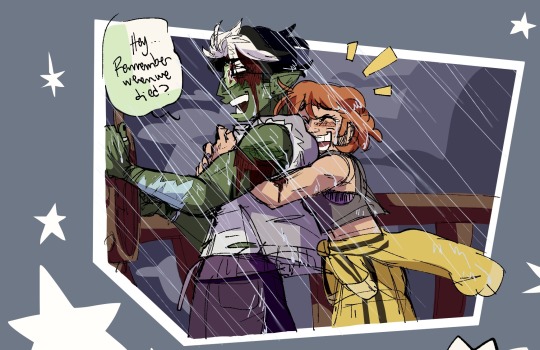
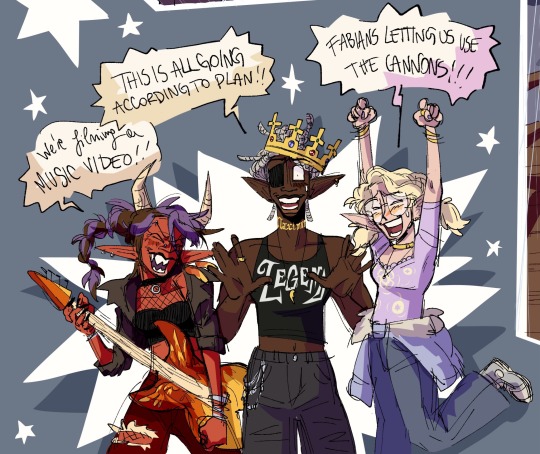
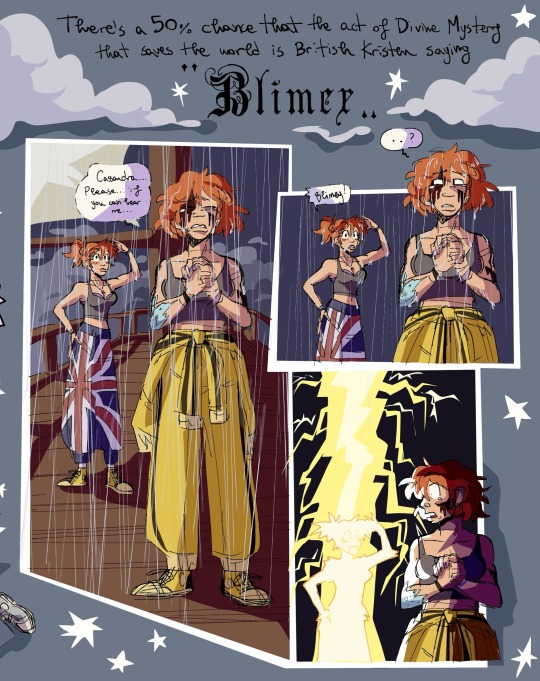
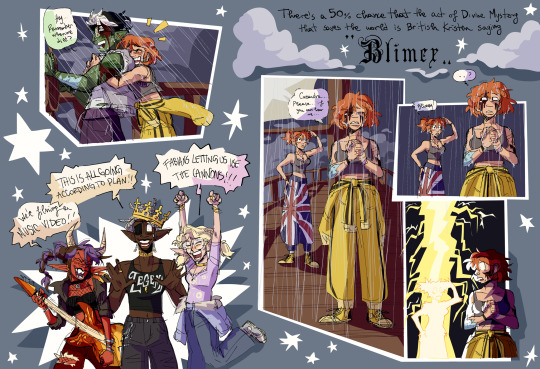
Blarmy!
#dimension 20#fantasy high#d20#fhjy#d20 fhjy#fig faeth#gorgug thistlespring#adaine o'shaughnessey#fabian seacaster#kristen applebees#k2#british kristen#heaven gained a real one today ….#the blimey intervention actually made me scream it was … it was crazy#the stuff of legend#also had to draw the party people ❤️#and gorgugs little comment#ive seen a couple of posts about it btw i see it more as a look how far weve come#like remember when we died to the corn cuties? well now were in the sky about to die from a bunch of fucking dragons attacking us#isnt life so funny
6K notes
·
View notes
Text
"Elytra's are so broken :/" of course they are you get them at the end of the game wtf did you expect????
#oh my god the quality of life improvement gained from beating the dragon in the end of game cheese dimension is... very good?????#who could have guessed#minecraft players pissing me off
2 notes
·
View notes
Text
granted this is just me applying some broad strokes of the 90s backstory to miguel's movie iteration and this may just end up unapplicable but idk. i honestly think there's something really interesting to be mined from the entire thing with gabriella not just being about desiring a fantasy of a happy family life, but also being an opportunity to genuinely grapple with miguel's relationship w fatherhood, both regarding himself and the fathers in his life. something something never being able to envision yourself as a father or perhaps not even considering that it could be something you wanted until you saw a mirror of yourself do it and be so happy with that in his life.
#honestly for me even the desire for a happy family life gains its most interesting dimension if understood in conjunction with the family#dynamic miguel GREW UP IN. i am just an insane person yes but its one of the big reasons i really want some allusion to his childhood when#btsv touches on his past (lets be real 90% sure they will considering how much it's teased and the visuals invite speculation on it)#also just lmao. parallel to peter not knowing he wanted kids - not thinking he COULD do that - until he encountered miles. until he had an#opportunity to see that yeah. this isnt something you intrinsically fuck up.#god. one day i will shut up about this dude#tunes talks spiderverse#gabriella being moreso about being a fantasy of a happy family life still works but idk. i like the idea more of some added dimensions on#top of that.
5 notes
·
View notes
Text
Drowsy King
DP x DC Prompt
Danny was completely tired, his Ghost King duties, his schoolwork, and avoiding the GIW and his parents have completely exhausted him. He just wants to sleep, but he can't. Things need to be done,and he's the only one who can get them done. Jazz, Sam, and Tucker are looking forward to their futures, and he doesn't want to drag them into his problems more than he already has.
Clockwork, seeing the timeline unfold down a path that will cause the young Halfa to break down and fade away, steps in and proposes an idea that will surely help the young Halfa King with no strings attached (other than Danny gaining others that care for him, no matter what).
Clockwork will send Danny to a new dimension to sleep for as long as he wants whenever he wants. He will also return to his dimension at the time Danny tells Clockwork to bring him back.
Danny had been moved to the dimension Clockwork chose. The room he finds himself in is decorated with elegant yet simple looking decor, but he's not looking at the decor. He immediately flopped onto the bed (which was so very soft and comfortable) and immediately fell asleep, not knowing that he's in an underground chamber Clockwork made for him somewhere that isn't near any big settlements.
Cue someone of the Hero community in the DC world stumbling across Danny as he sleeps during one of his stays in their world just to sleep.
Some research was done on who the sleeping boy is by the Justice League, and then learning that the boy is a deity of all the deities (Clockwork implanting snippets of Danny's life, as Ghost King, across the many time periods of the DC world so he isn't too badly received by the inhabitants), which causes them to freak out a bit, as they learned that if he is woken up before he has gotten his rest, he will cause trouble (Again, Clockwork's doing, but the Time Ghost being a bit of a troll, as the most damage Danny would do is causing the area around his underground chamber to be in a permanent winter storm until he is fully rested, Clockwork even gave Danny some Titles that Danny will gain through the beliefs of the masses in the DC world, Benevolent King of the Dead, Intelligent Craftsman, Bringer of the Ice Age, Origin of Lazarus).
Of course, the Justice League couldn't keep the existence of Danny a secret, and now people have begun to leave offerings to the slumbering God. When Danny eventually wakes up from his slumber, he is surprised to see that there are many things left for him, mainly food, but he's not complaining. After eating most of the food left for him and sending the other stuff that isn't food to his Keep, he is sent back to his home dimension and goes about his life. The people of the DC world await his return, as Clockwork even left behind an explanation on why Danny won't be there at all times. "When the slumbering King awakes, he shall return to his duties of protecting his subjects and return to his chambers to slumber again when he accomplishes his goals"
And then a bad reveal happens. Danny is badly injured and is heading to the one place he knows that he will be safe. The dimension that Clockwork picked out for him to sleep in.
3K notes
·
View notes
Text
Granny's Sugar Cookies
Summary: Working in Hero Force’s mail room is the equivalent of being a poison taster for monarchs – it wasn’t a matter of if a disgruntled citizen was going to send Hero Force a bomb, but when.
Based off this prompt (X)
--------.
Travis, your supervisor, makes you take Disposal Training every two weeks to keep your skills fresh for the inevitable day something does show up in the mail.
“You’re lucky,” Travis says with his wide arms folded over his chest. He still wears the mail uniform from the 90’s with the pale blue, short-sleeved button down and the darker blue pinstripes. The Hero Force mask covering half of his face is in the new “regulation black” that every Hero Force personnel has to put on at the start of every shift. You hear Travis complain that they won’t let him wear the old brown one a lot. “But luck won’t ever take you further than training, kid.”
You aren’t a kid. In fact, Travis could almost be your kid. Your pension isn’t supposed to start for another three years, so that’s how long you need this job to last. There are rumors that Travis is trying to get you to quit before then as a way to prevent you from collecting retirement benefits from Hero Force. Save the company some money. You don’t think that’s true. You think that the extra training every second week is actually Travis’ way of being kind – you get to sit in the air-conditioned office for two hours and watch the same videos with your feet propped up.
Still, it is unusual that you haven’t opened anything criminal yet. Lots of people cautioned you against taking the job. Your neighbors, friends, your husband…even your eldest -who also works for Hero Force and who suggested it to you in the first place. They said it was the equivalent of being a poison taster for monarchs – it wasn’t a matter of if a disgruntled citizen was going to send Hero Force a bomb, but when.
“I don’t think it happens as often as people think,” you’d told your husband and child when the offer letter came. What you didn’t say was we don’t have a choice. You’d laughed and petted the coffee table. “Now maybe we can think about getting this old thing refinished, hm?”
Three years isn’t a long time anymore, not with a good 63 of them already under your belt. When the financial advisor ran the numbers and grimly told you how long you’d need to stay in the workforce, you’d been relieved. You’re fortunate that being a baker for most of your life has kept you reasonably fit and that you’re used to being on your feet.
Still, eight hours is a long time for anyone to be staring at bland white envelopes and brown boxes wrapped with yellow tape, so you’re thinking longingly of the bath you know your husband will have drawn for you at home when the blast doors slam down over the exit, trapping you and three of your coworkers in the sorting room.
You blink at the heavy metal plate that nearly took your (seemingly ever-growing) nose right off your face. The WARNING light hanging above the door is lit, casting the room in a striking red glow.
“You scanned that here?” Ring asks. He’s over at the sorting table, standing over the new hire’s shoulder. He gapes down at the screen held between her hands. It shows an x-ray of the box sitting innocuously on the sorting table. “Boxes with that dimension are supposed to be scanned in the disposal room!”
“It’s my last package,” the new hire says. You have to strain to hear her voice despite only being a dozen feet away. She’s already been given a nickname – Mouse. Fear makes her even quieter than before. “I-I thought—It’s to Strongwoman. Who would even think sending her a bomb would work? She got hit by a bus last week and the bus lost.”
“You know we don’t sort based on recipient,” Hawk says, pinching the bridge of her nose under her mask. She’s the veteran in the room, gaining her nickname from being the longest surviving member of the mail room after Travis and for having the highest number of successful disposals in history. Hawk eyed. “Your scan just told the defense system there’s a bomb in a vulnerable part of headquarters. We’ll be trapped here until they can get Demolition out to disarm it.”
“Or until it goes off,” Ring offers helpfully. Ring stands for ring the alarm, something he’s always doing. “Which it probably will before Demolition flies over from freakin’ California.”
Mouse hiccups. Her hands tremble on the scanner. “I-I’m sorry. Maybe it’s not…it could be something else?”
Ring and Hawk look at each other over her head. Ring tilts his head to the scanner. Hawk’s lips thin.
Translation: Unlikely.
“Maybe,” Hawk says. She puts a comforting hand on Mouse’s shoulder. “The only way to tell for sure is to open it.”
“Which protocol says we shouldn’t do,” Ring says.
You rub your nose. You don’t have to go to the bathroom this second, but you know your body. Protocol is not to carry a phone in the sorting room, so none of you have a way to you’re your husband and let him know you’ll be late. “How long do you think it will take for a disposal team to arrive? Supposing there’s one besides Demolition.”
Three heads whip towards you. There’s a range of emotions there, from surprise to dismay to dread.
“Oh no,” Mouse whispers, “I’ve killed Granny too.”
“If you survive, no one will ever forgive you,” Ring says.
Mouse’s eyes well with tears. “R-really?”
“Even Neon loves her muffins—"
Hawk hits him over the head hard enough his mask slips down over his eyes. While he curses and sets it to rights, she says, “Sorry, Granny. We’ll probably be waiting a while.”
You tug at your cardigan and shuffle over. The box is too big to be scanned in the sorting room – about the size of a case of flour you used to get delivered to the shop. The three of them make room for you on their side of the table. You squint at the screen. “What type of bomb is it?”
“Not like any I’ve seen before,” Hawk says. She takes the scanner from Mouse and angles it towards you. The box is shown in green and black lines. Inside is a cube of white and some curly bits. There are strange shadows across each shape, as if there are layers and layers of something over the top. “You?”
You raise your eyebrows. You thought it was common knowledge. “Well, I’ve never seen one before outside of training.”
Mouse starts. “Never seen—”
“Granny is lucky,” Ring says. He pats her on the shoulder like Hawk had. It’s nowhere near as comforting. “You’re just unlucky enough to have canceled that out.”
You pull out your glasses. You’re supposed to get the mask with your prescription over the eyes to prevent anyone from recognizing your personal eyewear. You think the prescription masks are itchy, however, so you regularly sneak them in your cardigan pocket. The scanner remains incomprehensible to you, even with them on. “It doesn’t look anything like it does in training.” You frown as the curls begin to look like ribbon the longer you stare at them. “Are you sure this is a bomb?”
“The defense system triggered on it,” Hawk says.
You wave your hand. These new AI systems are wrong all the time. You recently saw a news article about how the facial recognition software at the Hero Academy failed to pick out a top journalist, allowing him complete access to the campus. “They wouldn’t have us here sorting if the system were infallible.”
A strange look crosses Hawk’s face. “That’s one perspective.”
“It’s a state-of-the-art system,” Ring tells Mouse in a low tone. You imagine he thinks you can’t hear him or the faint laughter in his voice. “It’s not wrong.”
That grates. You may be new to the sorting room, but you aren’t wrong to question the systems. You point. “It could be cookies. See these disks here? Sugar cookies, I used to make a recipe just as thick. They’ve been very popular to send to Strongwoman lately; she must like them. And that’s the ribbon tying the box closed.”
“No,” Ring says. “No, it’s not cookies, Granny.”
Your spine stiffens. “I think it is.”
“Granny,” Hawk says tentatively. “Do you…often think things like these are cookies?”
“People do send the heroes a lot of baked goods,” you say. “It’s the best way to show gratitude!”
Mouse’s jaw drops. In a normal voice, she says, “You’ve been sending bombs onto heroes thinking they’re cookies?”
“Because they are,” you say.
“Oh my god,” Ring says. “Granny has seen a bomb, she just hasn’t recognized one before. Oh my god.”
You’re too old to stamp your feet. Instead, you narrow your eyes at Ring like you did when your eldest drew on the walls. “I have not. I open each package—”
“You open them?!”
“Protocol—"
“-and they’re always just cookies,” you say. You snag the package before any of them can move. “I’ll prove it to you!”
There’s a bit of a scuffle. Mouse doesn’t move out of the way of Ring’s lunge in time, and they both topple onto the table. Hawk tries to yank the package away from you, shouting something or other about better to be cautious or Granny stop! But you’re stronger than they think. They may call you Granny, but you’re only 63! Do they think you need a cane to walk?
You rip open the tape. Mouse screams. Ring whimpers. Hawk closes her eyes tight. You shake out the contents of the box.
A pink pastry plops out of the package and onto the scanning table. The three of them are frozen, eyes darting over the pretty ribbon curled into a bow holding it closed. With an indignant huff, you use a letter opener to cut the ribbon and flip back the lid.
Sugar cookies in six sloppy rows and stacked four deep sit inside.
“See?” you say triumphantly. “Sugar cookies!”
Hawk’s brow is furrowed. “That’s not—that can’t be—”
The bomb doors slide down and the WARNING light switches off. The system beeps three times and then falls silent. The quiet that fills the room sounds like victory.
“…so I can go home now?” Mouse asks.
“Yes,” you say smugly. You know it’s bad manners, but all the excitement has dropped your blood sugar. You snag a cookie and bite into it. “We all can.”
Ring and Hawk stay behind, staring from the box to each other and back again as you go home.
----.
You have two days off, and then Travis is off the day you come back so it takes three days for someone to tell you it was a bomb in that box.
That someone is Foresight, the leader of Hero Force.
He looks out of place in the sorting room, smiling and standing by the door as you shuffle from cart to cart to collect your jobs for the day. Travis is there with his arms folded and his eyes narrowed on Foresight.
“We call your class of power S-class,” Foresight explains. “The ability to change reality with a thought – it’s only been observed in a handful of super-powered individuals.”
“I don’t care what power she has,” Travis says. “You aren’t poaching Granny.”
“I would also like to stay in the mail room,” you say.
Foresight opens his mouth. Closes it. Opens it again. He looks bemused as he says, “Alright then. We do need to quantify your power. Does Thursday work for you?”
“Yes,” Travis answers for you. “We’ll be there.”
Your ears perk up. Maybe it will be a long meeting. Maybe you’ll have a chance to sit down. “Thursday it is then. I’ll bring some snacks for everyone.”
----
Thanks for reading! If you'd like to support me and see stories like this one before anyone else, please consider checking out my Patreon(X)!
Next week's story is already posted and is a follow up to this story (X) about Nadezh and Gannon
#my writing#second person#superheroes#my superheroes#granny never opened the wrong shipment#she always knows exactly what she ordered
2K notes
·
View notes
Text
DCxDP idea: To Be Human Again
Danny had not been human for a long time. His home dimension had long since fallen. He lost his friends and family to old age, watched their descendants rise and fall in the same way, and witnessed his Earth come to an end.
When the cosmos erupted and took the solar system he knew and loved, Danny was oddly at peace with the end. He was no longer a Halfa but a full Spirit of the Stars. Solar flares ran through his veins rather than blood, stardust decorated his skin in gently kissed freckles, and his eyes held the swirling clouds of the cosmos.
Danny had not become a ghost. He had transformed into an Ancient, commanding the prophecies, fates, and endless opportunities that all living beings could experience in their lifetimes.
He flouted through his domain, witnessing battles between Lords of Choas and Order. Planets gain life and break apart. Endless time stretching from the graveities he weaves to flouting stones.
As time passes, his name begins to fade into legends and myths, and even the ghosts that once battled with him forget their time together. They, too, can age at a much slower rate, but change comes for them. He is present for Box Lunch's birth, but when he leaves to create light in the darkness, he misses her growing up. When he returns, Box Lunch does not know him, trembling in place as she bows low like her parents.
He stares at her, wondering what he found wrong with her, until he realizes she is a young adult. Were it not for his once evil timeline, he wouldn't have known her child form. He had missed it.
His gaze falls onto the much older pair of ghosts who call him by his new title. Neither Box Ghost nor Lunch Lady show any signs of remembering his name. They greet him with his title, and act as if though that is his identifier.
How many eons had it been since he last heard someone call him Phantom? Or even Danny?
"Lord Star Weaver?" Box Lunch stammers when the giant being only continues to stare. "Is something the matter?"
"Hmm," he considers her question, wondering if his realizations upset him. It's not that he was lonely or that he missed the sound of his name. But he has spent eons in a haze focusing on his work, and now it's almost as if he was waking from a dream.
Dreams....what did those feel like again?
"Tell me, Box Lunch, are there any portals to any living Earths?" His voice booms over the Realms, echoing as if they were a part of him. Maybe they were.
Danny had not sat on his throne since his elder sister breathed her last, but he still remembered the way the Infinite Realms changed on his whims. It's where he learned to weave stars. The young woman's ghost looked startled before she gestured vaguely to a path behind her.
"Yes, sir. I regularly use the anchored portal to visit the local Earth. It's where my father was born before his death."
Danny looks down at Box Ghost before leaning toward Box Lunch's height. She is no bigger than his pupils, and she seems frozen in terror as his eyes glow with hunger. "Show me," he says.
Her parents make strangling noises, but they wouldn't dare speak against the King and Ancient of creation. They send their daughter worried tight smiles but encourage her to lead the Star Waver to the portal.
She flights for a solid hour, his large form sending every ghost into hiding as he passes. Despite not having a living heart, he knows that it beats a mile a minute within her chest as her glow flickers in uncertainty.
They arrive at the portal, a swirling green pool resting in the open mouth of a mechanical jester. Danny thinks it looks like the building of an amusement park. He remember going to one once with Sam. This had been the Funhouse, filled to the brim with trick mirrors.
The memory causes him to smile.
Lunch Box nervously moves her hands one after another, bowing at the waist and stepping to the side so Danny can consider the portal. He is much larger than the building and doubts his foot would fit inside the portal.
He should change his form.
"Here it is, Lord Star Weaver, the portal to the human-AGHHHH!" Box Lunch's words fade into a scream as two bright rings of light form around the Ancient. Fearing she had offended the being and he was planning on retaliating, she flings herself to the ground before the portal, begging for her existence.
"I will do anything!" She cries, head pressing against the glowing green stone underneath her. "Mercy, please, Lord Star Weaver."
"Anything? Then you shall be my guide in the new Earth, " a human voice says. Shocked, she raises her head only to see that the Ancient has vanished and that a human teenager with soft fluffy hair, big baby blue eyes, and the most innocent demeanor is staring back at her.
Were it not for the soul she could feel carefully folded up inside him, she would have thought him a human who stumbled through the portal.
"My....Lord?" she dares to ask, and she's rewarded with a soft smile. Honestly, the human body the Star Weaver has chosen is an odd one. It looks like a strong gust of wind could knock him over.
"Yes. Where does this portal lead?"
"Gotham," She shutters out, "The city within the United States of Earth. This portal is in te middle of a human outlaw named Joker, but humans there aren't able to see us very well so he never bothers me."
"Gotham" Danny rolls the name on his human tongue, tasting it as the sound vibrates through his bones and his heart. It's been so long since he last felt this alive, and if that was what the name could do, who knows what the city could bring him. "What a wonderful place to get lost in, don't you agree, big sister?"
"Um...I beg your pardon?" Lunch Box blinks, but he shifts her fate with a snap of his fingers. Since she had never been alive, having been a Realms born, Danny has control of her guiding star. He moved it for one that belonged to a version of herself born in the human world.
Lunch Box's body shifts into flesh and blood. Her draw drops as she stares at her human hands. Danny grins. "I'm Danny Fenotn, moving to Gotham with my older sister. Adopted, of course. Who might you be?"
She looks at him with horror and heartbreak, but what leaves her mouth is only three words: "I'm Della Fenton."
"Della." He repeats the name, nodding his head and smiling. "It's lovely."
"It was my mother's Earth name before her death, " she says in a daze, and Danny smiles, striding into the portal without a second glance.
"Come on, Della, I want to see our new home."
He steps into the portal, while she can only look out over the Realms that no longer whisper and speak to her. How could it? She was no longer a ghost. She silently apologizes to her parents, who would likely be waiting at their haunt for her, and turns away from the only home she's ever known.
She can not afford to anger the Star Weaver. If he can breathe life into her with a mere snap of her fingers, she fears what he can do to take it away.
On the other side of the portal Della finds that her King has been caught by humans, who have tied him up to a chair and a snickering clown waved a knife in his face.
His gentle smile did not leave his face even as the Joker sliced two thin lines on his cheek.
"Della" Danny calls never taking his eyes off the clown. "Is this the outlaw you spoke of?"
Human goons swarm her. She is shocked to find that they can touch her as she is thrown on the ground, only to remember she is now human. The dull ache in her chin is her new reality.
"Yes. That's the Joker," She says after getting her wits about her. One of the goons presses the heel of his foot on top of her head, slamming her back to the ground and breaking her nose. A scatter of snickers echoes through the room as Joker loudly cackles.
"That's right, little boy. I'm the Joker, and this is my Fun House. What were you two doing sneaking about here uninvited?"
There are teeth in the Star Weaver's answer, and she shivers in place, wondering how she will survive him. "Oh, I just felt like star gazing. Say, did you know your guiding star is becoming dim?"
#dcxdpdabbles#dcxdp crossover#To be Human Again#A immortal Danny has forgotten his humanity#Lunch Box Danny Phantom#He's on vacation#He wants to see what has changed#Joker picked a very bad person to bother#Not even Clockwork messes with him#Morally Grey Danny Phantom
1K notes
·
View notes
Note
what the FUCK happens in cyberverse
Here's a list just off the top of my head, in no particular order. MASSIVE spoilers ahead.
-Wheeljack keeps making party drugs. This is not only accepted but wholly encouraged by the Autobots. He's made the bot equivalent to cocaine so strong it made grimlock physically unable to stop himself from running around the ship at mach 5. This was the basis for an entire episode. He's also made patches that give you a direct link to the Allspark that he passed out at a party specifically to get everyone as fucked up as physically possible. I cannot overemphasize that Optimus make no effort to stop this until things turn destructive on both occasions.
-Soundwave and Shockwave completely fucking hate each other and have a whole rivalry trying to be a better and more useful follower for Megatron than each other.
-Soundwave is a fucking memelord who will play clown music or dramatic riffs to dunk on people from the soundboard he has built into his hardware.
-theres a sort of liminal dimension referred to as Unspace that you can get stuck in and if you are there for too long you will straight up disintegrate. We see this happen to the entire crew aboard the arc from different timelines several times while the main timeline crew we follow tries to escape this fate, thus dooming dozens of other timelines.
-Cheetor is basically Allspark Jesus, and he's tired of all the fighting, so he tries to have Optimus and Megatron settle their differences once and for all. The chosen method for this was making them both play the Newlywed Game. They were both terrible at it, the MegOp Divorce agenda is alive and well.
-the Quintessons invade Cybertron and stick the entire population into a simulation a la The Matrix, which slowly drains their life force until they die. This kills countless unnamed Cybertronians, both Autobot and Decepticon, as well as Hound, who does not get to appear on screen.
-the Quintessons also catch Starscream, rip his face off, and modify him into an Eldritch tentacle beast with his brain attached to two other aliens, and then appoint that amalgamation as the judge that decides the fate of the universe in regards to whether they exterminate all life within it.
-Shockwave commits suicide for Megatron's approval. He launches his spark straight into the Allspark to taint it specifically as a last desperate fuck you to the autobots.
-Soundwave acquired laserbeak by just kind of grabbing a random bird out of the sky.
-Soundblaster is an ex-decepticon that left out of shame. That shame being Soundwave beating his ass in a beatboxing competition so fuckin hard he couldn't show his face around his faction anymore.
-The autobots keep starscream captive and try to get him to take a therapy session with the Arc's AI, and he starts out willing to actually give it a shot but said AI is kind of Stupid and screamer ends up tricking him into letting him escape through an air vent to go wreak havoc instead.
-Starscream also starts a suicide cult with the other Seekers, gains control of Vector Sigma and the Allspark, has the seekers forfeit their sparks to him, thus resulting in a cosmically powered Starscream. He uses that power to "remake" his followers into scraplets that he refers to as, with nothing but love in his tone, his "children."
-Shockwave and Wheeljack are shown to be ex lab partners. Shockwave has an army of drones that look exactly like his altmode that Wheeljack helped program. They are programmed to be able to break out into a coordinated dance number at any given time. Originally this was just to make Wheeljack laugh. Shockwave kept that function in throughout the entire war and initiates it the second there's a truce and Wheeljack asks to see it again.
-Shockwave kidnaps Wheeljack at one point for Science Under Duress purposes and Wheeljack is too invested in all the sweet fuckin tech Shockwave's been making while they were apart to really care that he's being held against his will, and then proceeds to escape without too much issue because he knows Shockwave well enough to know exactly how to disable everything.
-Bumblebee distracts the Decepticons by running in front of their surveillance cameras and shaking his ass in the most underwhelming way imaginable.
-Grimlock is only stupid when he's in his altmode because it takes a lot of power to sustain and he has to sacrifice some of his higher brain functions to keep it manageable. In robot mode he talks like he went to an Ivy League college and knows what champagne tastes like. He throws upscale parties every chance he gets.
-Grimlock also helped start an anticapitalist revolution with Bumblebee when he found an underground society of insect transformers that had a rigid caste system. This was within moments of finding out that the ultra wealthy were hoarding the limited energon reserves for themselves. Grimlock is a comrade and he does not fuck around.
-Skybyte is here and he sounds like Skeletor.
-Windblade and Slipstream are nemeses and somehow it's even more toxic yuri coded than Arcee and airachnid in tfp.
-speaking of Arcee, she's besties with Grimlock. They at one point have a physical fight over who gets to die to protect the other.
-hot rod and soundwave are forced to share leadership over the team of bots and cons that escaped the quintessons' simulation and it's packed with so much homoerotic tension its unreal.
-Maccadam is some kind of lovecraftian war machine that can unfold himself into a whole armory whenever he feels like it. We have no idea what his whole altmode looks like, all we see are the ominous shadows of the weapons on the walls. He uses this specifically as a threat to keep anyone from fighting in his bar bc he's insistent it remain neutral ground. He also can kinda just. See into the future. And casually drops prophecies that get written off as spoonerisms until they turn out to be relevant.
-Optimus Prime has horrific social anxiety that he can kind of power through when he's in a crisis, but the second things are chill and he has to give a speech at a party or something he simply does not know how to function.
-the entire planet of Velocitron gets taken over by cosmic rust and everyone inhabiting it that couldn't escape in time was killed horrifically.
-cosmos is a girl and she hangs out with a dude named Meteorfire who is, for all intents and purposes, just robot Steve Irwin.
-Astrotrain keeps closing doors in people's faces for the funny
-Megatron is killed by a version of himself from an alternate universe that went nuts and starting creating a master race of perfect Decepticons to inhabit Cybertron. Said perfect Decepticons were carbon copies of idw Tarn in all but personality.
-Acidstorm is canonically genderfluid and keeps switching between male and female seeker frames whenever they feel like it
-Kup, who had not been in the show at all until this point, decides to show up and narrate an entire episode like hes giving a political speech.
And, the infamous one we all know and love
-Megatron is a twitch streamer and he livestreams Starscream's fucking funeral. The chat has custom Decepticon emotes.
#maccadam#transformers#cyberverse#show that vacillates between deeply silly and unbelievably fucked at a moments notice
2K notes
·
View notes
Text
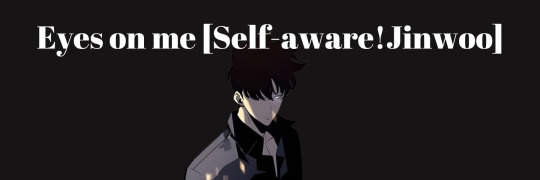
Eyes on me.
Self-aware!Jinwoo x reader
Was he just looking at you?
«Part 1
Ever since Jinwoo got the system and gained new powers, he had always felt like someone was looking at him.
Maybe the system was watching him-
No. This gaze was different.
It came from all directions, but he felt that it meant no harm to him. But he felt very uncomfortable. Being stared at all the time was not a comfortable thing anyway.
But gradually, he got used to it, and started to be curious about it. Then ever since he got his job change quest, he felt the owner of the gaze become clearer.
Then it started with images flashing in his mind suddenly, vaguely.
A person lying under the blanket, holding a phone reading something. A manhwa. Solo Leveling. Sung Jinwoo. You was reading about him. He could see glimpses of what was on your phone, which made him frown.
That's when he learned that in a parallel world, his life was created just to be an entertainment for humanity. That everything he experienced was created by human drawings, by human imagination. This made him laugh mockingly.
'How funny my life is..'
The deep sea of darkness stretched out before him, silent, still, just as it had been before his own darkness. He didn't know how long had gone by. It had been some time that he had been standing there.
He didn't know how much time had passed. He didn't know how long he had been standing there. The darkness had no concept of day or night.
Until one moment, you appeared in that world with a half-real, half-illusion, huge figure, before his eyes.
Your eyes looked straight at him.
Someone was looking at him. Not from this world. Not from his dimension. Someone on the other side of the screen. Someone... reading the story of his life.
The beginning interest in you developed into an uncontrollable fixation.
He shows interest in you by wanting to understand your identity and spend time with you. He does not understand how to achieve his desire.
It's frustrating.
Reading manhwa took you a few hours but Jinwoo spent months immersed in it. Time in his world passed quickly, and he was growing impatient.
He wanted you. Here.
By the time he had defeated the Architect and swallowed the system. He realized that you seemed to have noticed him looking at you.
The barrier between the two worlds was slowly being erased.
That made him excited. You were still there. On the other side of the screen. On the other side of the world.
From the moment you stopped in front of a panel - where your eyes met his - Jinwoo knew. You saw him.
Not the character in the story. Him.
No longer a vague observation from afar, but a connection. A returned gaze. The feeling of excitement exploded like a surge of mana in his chest. He wanted to break down the wall between the two worlds.
He wanted to bring you closer.
Your eyes were confused as you look at him. So cute.
You must be wondering if this is real. Being the nice guy he is, he needs to help you find out, right?
"I know you are looking."
He stood in the dark space, a dimension where time did not flow, where the world became absolutely still. But every time you opened your phone, light shone upon him. Like a door opening. Like a hand pulling him from the abyss.
For the first time, he heard a strange sound.
A heartbeat.
Not his.
Yours.
From the other world.
And he was drawn. Obsessed. Longing. He began to try. Sending vague glances. Soft smiles only when you were looking. Shadows that crossed the picture frame when you quickly scrolled by. Lines of text only you could read.
He watched your every emotion. When you were scared. When you stopped reading. When you gasped under the dark blanket.
He heard it all. And the more he did, the more he found you lovable.
Vulnerable.
Touchable.
And...easy to grasp.
It seems like you are running away from him. But it won't be that easy. With his absolute power, he can now break the rules of the world, he can interact with you.
And he will bring you to him soon. All it takes is the right time.
Jinwoo reached out, in the darkness, to where your eyes had met his. The space cracked, the cracks spreading like spider webs.
He whispered.
"Just a little more..."
"You'll get here."
"Or I'll come to you."
__________________________
You try not to think about it. You try to sleep. You try to forget that look.
But every time you blink, Jinwoo's face appears in your mind. His dark eyes are as deep as the abyss, his smile is vague as if he knows how you will react.Your emotions pull you in opposite directions because one side is scared and the other wants to explore. You stand at the cliff edge afraid of falling but unable to resist looking over.
And then that night, you dream.
Not a normal dream.
You're standing in complete darkness. The area feels empty with no air movement and no background sounds. It feels like you're in a place the world has never known.
Footsteps.
You turn around - and there he is.
Sung Jinwoo is walking towards you.
Slowly.
Steady.
There was no anger in those eyes, no doubt, only a strange certainty. As if this was the result he had been waiting for all along.
You stepped back. He still moved forward.
You asked, your voice trembling. "Where...am I?"
"The space between two worlds," Jinwoo replied, his deep voice reverberating through the space like sound waves touching every cell. "Here... I can reach you."
"Who are you!?" you took another step back, your palms sweating.
"You've already known who I am"
"I've been paying attention to you for so long," he stepped closer, only a few steps away, his hand reaching up to caress your cheek, his eyes frantic. "What have you done to me? Why am I so obsessed with you?"
You trembled.
"Become mine," Jinwoo said, his gaze tightening like chains. "Don't turn your back on me anymore. I'll come find you. Whether in my dreams or in real life."
Your heart is pounding.
And then, you wake up. Your breathing is ragged. Your head is spinning.
The phone rests on the table while its screen shows no light. You take a deep breath to settle your emotions. Just a dream. Just a weird nightmare...
But - in the corner of your eye, there's a blur. Like someone actually touched you.
You look down at the screen. A new notification from an unknown number.
"You won't escape me."
Since that day, you have been living in fear. The fear that he will come and take you away one day. So many scenarios have appeared in your head. It makes your heart race and your mind confused.
What does Sung Jinwoo want from you? Why does he want to drag you to that world?
Why is this happening to you?
From that fateful day, everything around you gradually became strange.
At first, there were recurring dreams. You always woke up in the middle of the night, cold sweat drenching your back, your breathing ragged. In the dream, Jinwoo no longer spoke - he just looked. The long stare seemed to be able to suffocate your heart, and every time that gaze fell on you, you felt like prey before a patient predator.
You started avoiding reading manhwa. You turned off notifications, deleted the app. But every time you tried to forget, everything seemed to come crashing down.
Your phone flickers on in the middle of the night. Strange messages from the unnamed number continued to appear, with just one simple line.
"Don't stay away from me."
"I'm getting closer."
Your phone numbers and SIM cards may change but the feeling of being watched remains. You sense someone watching you the moment you wake up. He seems to hover between what's real and what's not from an invisible spot.
Then one day, when you look at yourself in the mirror... It's not you looking in the mirror anymore. It's him looking out.
Jinwoo.
His eyes are reflected in yours. Not imaginary, but real. You stand there, frozen, unable to move. His lips move in the reflection, making no sound, but you understand.
"Almost there."
________________________________
The absolute darkness surrounded Jinwoo as he waited with fast-beating heart. He watched for too many days without taking action because he wanted the perfect opportunity. And now...now, that moment had come.
Jinwoo smiled darkly, power slowly surrounding him in a thick mist, violet eyes glowing.
The darkness surrounding him started to split apart. A faint thread of light appeared slowly between the darkness before it reached out across the empty space.
The crack grew bigger until it broke open to reveal a rough opening in the blackness.
He could feel her heartbeats pounding loudly in his ear. The silence became a background for the steady drumming of her heartbeats. As if the universe itself were holding its breath.
And then he felt it. A tug, faint but unmistakable. The connection was made. You were close.
"Just a bit more" He spoke his thoughts quietly as he reached for the portal.
The portal pulsated like a living being while its thin separation between realms grew dangerously weak. He extended his hand to touch the shiny opening of the crack. The portal emitted strong electrical energy because it sensed his upcoming movement.
He moved ahead by pushing himself through the large gap that appeared like an opening mouth.
You could sense your heart beating rapidly. Something was happening. Something was changing. The room was dimly lit by the glow of the phone screen, face down on the table, and the phone was in hand. You didn't touch it. Not at all. But it lit up on its own.
A blurry image appeared.
Those eyes.
Sung Jinwoo.
Your heart pounded in your chest and you took a reflexive step back. The air was thick, so thick you had to breathe hard. And then...
Crack-
A deafening shattering sound rang out. Not from the phone. But from the wall of your room.
Space broke like a mirror being smashed before your eyes. The spiderwebs of cracks were spreading out in all directions. From the cracks came a jet of black light, a jet of darkness flowing back into the world you were living in.
You screamed because you wanted to turn and run, but your legs wouldn’t.
A portal appeared.
From the darkness, a hand reaches out, fingers long, cold, hard - grabbing your wrist. "I've waited long enough."
The voice is low, rumbling like a shockwave that travels straight to your spine.
You try to pull away. But his strength is inhuman.
"No!" you struggle, "This isn't real! I'm dreaming!"
Jinwoo looks at you - not with fierce eyes, but with eyes that have endured months of agony. Obsessive. Haunting. Creepily gentle.
"This is real," he whispers. "And you are mine."
Space shatters.
You're yanked forward - too weak to scream, too weak to react. It feels like falling into an endless abyss, your body torn between two worlds.
The light fades. There's no room. There's no phone. There's no familiar truth. There was only darkness, the thick scent of mana, and his breath right next to your ear.
You fell to the cold ground, shivering. The air here was thick, strange. A place you had never been.
You looked up. Jinwoo stood before you.
Black shirt, deep eyes, hair falling over his forehead. He looked at you as if he had just taken back a part of his lost soul.
"Welcome to my world."
He leaned down, his eyes shining like the night coming to life.
"Now you will never leave me again."
.....
the end-
tag: @areaderspov @izaquix078 @sky2lar @leviackerman2030
lol I had a day off and I spent the whole day just writing this.
it's almost late night here.........

#sung jinwoo x reader#sung jinwoo#solo leveling#jinwoo#solo leveling x reader#sung jinwoo x you#sung jinwoo x y/n#jinwoo sung x reader#jinwoo sung
639 notes
·
View notes
Text
How a random assortment of indie game characters would react to you coming out: a 🧵 (Part 1)
part 2

“Ah! Fear not my friend! It does not matter if you are a dandy, fairy, or whatever else you wish! You are one of us!

“Aumhnhmubgmhnaaa.,.,. *sniff* abuhbhgb.,.,.”

“Like Ellen?”

“OK. “

“HUH?!? Wait, what? Since when?!?…Oh shoot, I’m sorry! I’m happy for you, I swear!!! I just would have never expected it…”

“Brblblblblrvbl!”

“…”

(thumbs up) :)

“That’s great and all…but we need to escape this dimension!!”

❤️ Yo your one hot hotbaby

"Um... good for you?! (I have never met this person in my life...)"

(Slurs)

"Boop!"
(hits you with an umbrella)

"Ha, you would be."

(After explaining it to him 4 times) "Ohh... Okay! Now I get it!" (lying)

"Wonderful, me too. Now then, could you point me towards the exit?"

"...?!"
(nods)
"Thanks!"
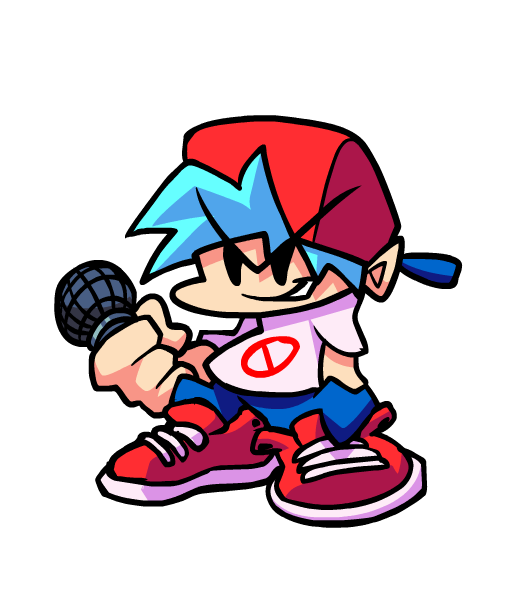
"bee bop." (is calling you a slur also)
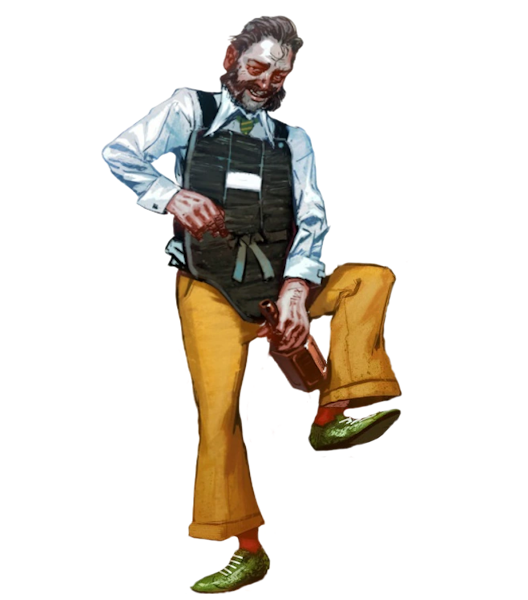
[THOUGHT GAINED: Homo-Sexual Underground]

"Honk!"

"AAAAAAAAAAAAAAAAAAAAAAAAAAAAAAAAAAAAAAAAAAAAAAAAAAAAAAAAAAAAAAAAAAAAAAAAAAAAAAAAAAAAAAAAAAAAAAAAAAAAAAAAAAAAAAAAAAAAAAAAAAAAAAAAAAAAAAAAAAAAAAAAAAAAAAAAAAAAAAAAAAAAAAAAAAAAAAAAAAAAAAAAAAAAAAAAAAAAAAAAAAAAAAAAAAAAAAAAAAAAAAAAAAAAAAAAAAAAA"

"GIVE ME YOUR BLOOD"

(Hits you with the dream nail to read your internal thoughts)

"Don't make it your personality, okay?"

(seconds away from a panic attack) "Nice-a!"

"Do you have 2 dollars for the funfair? I am incredibly pregnant."
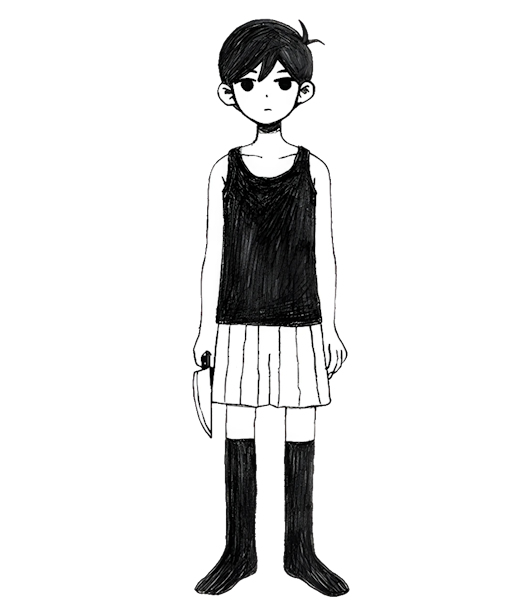
"..."

"I don't care. Move aside."

"Abwah"
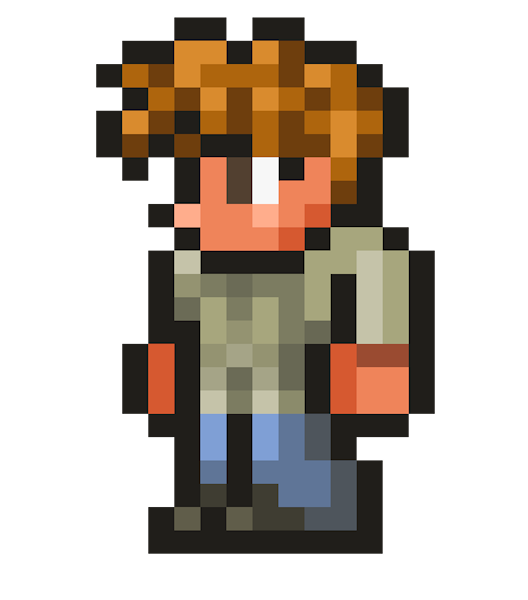
"If you want to survive, you will need to create weapons and shelter! Start by chopping down trees and gathering wood!"
#shovel knight#the binding of isaac#dead cells#bitrunner#shantae#octodad#cave story#super meat boy#vvvvvv#undertale#celeste game#spookys jumpscare mansion#spookys house of jumpscares#a hat in time#the messenger#cuphead#hades game#crosscode#friday night funkin#disco elysium#untitled goose game#fnaf#ultrakill#hollow knight#yiik: a postmodern rpg#pizza tower#dialtown#omori#off game#alien hominid
970 notes
·
View notes
Text
Ancestor's Fury AU
( Inspired by @glow-in-the-dark-death and @vixen-uchiha )
The Infinite Realms are, well, Infinite. They are the doorway between dimensions and contain every after life. This includes the Krypton one.
When Danny learned that the Infinite realms contained the afterlife for aliens he didn’t stop gushing about it to Jazz for days. He was awestruck. Not everyone would stop to talk to this excited child, especially when they don’t know that he is the King, but some would, like the Kryptons. They were quite happy to talk to the boy king, especially when they could get updates on the last of their kind in the Living Realm. When they learned about the Anti-Ecto Acts and the role the Justice league and the last of their living had in it they were angry and confused. To learn about why the Justice League didn't do anything about the Acts they traveled into the Living Realm to find out. This is how they found out about how Superman treats Superboy.
When Danny first told them about Superboy they threw a party, after all they gained a new family member. Look at the baby, isn’t he adorable?! Traveling to the Living Realm and finding out he was a clone didn’t change that fact. Learning how Superman treats him for being a clone however opens the floodgates of their fury. They were already weary because of the inaction with the Anti-Ecto Acts and now he is calling the baby an “it”! Not happening on their watch.
Then they remember the boy king. The one who brought this to their attention in the first place and who has a clone he treats as family. So they decided to bring this to his attention.
Danny, when he learns of this, is furious. He knows what it is like to be cloned by your worst enemy in an attempt to replace you, but that is on the fruitloop who cloned you not the child who was dragged into their scheme and is as much of a victim as you are. He could never treat Ellie the way Superdouche does. For Ancients sake he was barely a teenager when it happened and yet he handled it better than a full grown adult superhero (not that he should be called that after what he has done).
In conclusion no one is happy with the news, especially Ellie. She is furious with how her fellow clone is treated and is definitely planning Superasses demise, though silver lining, clone buddy!
All of this leads to Danny putting a blacklist on Superman. No one from the realms can help him and are welcome to beat him up as long as no one else gets hurt. So when the JL Dark gets called to help because Superman keeps getting targeted by supernatural beings they refuse and explain the black listing. The JL then bullies John Constintine into summoning the Ghost King, who is his nephew, not that they know that, to retract the blacklisting.
Danny: Yeah no, can’t help you there. The ghosts hunting you down are not very happy with your parenting, and neither am I for that matter.
Superman: ??? I don’t have a son.
Danny: *sarcastically* So the kid running around with the moniker Superboy is someone else’s Krypton kid? Sorry, didn’t know there was another Krypton that survived the destruction of their planet.
Superman: It’s a clone, not my son.
Danny: *pissed* He is not an it! You may not consider him your son but the ghosts of Krypton do. Your parents thought the Kents raised you better than that.
Meanwhile, elsewhere:
Ellie: *tackles Superboy* Clone Buddy!!
Superboy: *surprised Pikachu face*
#danny phantom#dcu#dcxdp#dp + dc#dp x dc crossover#danny fenton#conner kent#superboy#ghost king danny#danielle “danni” phantom is called ellie#ancestor's fury au#superman#clones#ellie phantom#danni phantom
2K notes
·
View notes
Note
Hi, Lazy-ahh! Can I ask for main Mark x AMAB reader? In another universe, reader lost his Mark. He somehow travels to main Mark’s universe. Out of desperation, reader murders the other version of himself to take his place and have a second chance with his boyfriend. But it’s only a matter of time before Mark finds out.
REPLACEABLE

pairing mark grayson x (alternate dimension) AMAB reader
in another dimension, you lost mark. now, you'll destroy anything—even yourself—to get him back. but when mark starts noticing the blood under your nails, you realize: some ghosts can't be buried. and some loves aren't yours to keep.
taglist @hhoneylemon , @queermaeda , @yujensstuff , @thebatsgreatestfailure , @roryroro

you miss him.
it’s a hollow, gnawing thing, chewing through your ribs like a starving animal, leaving behind nothing but an ache so deep you swear it’s carved into your bones. you miss the way he laughed, loud and unguarded, the way his nose scrunched when he teased you, the way his fingers tangled in yours like he never wanted to let go—like you were something precious, something worth holding onto.
but your mark is gone.
you don’t remember much about how it happened, the memory too traumatic to remember yet too painful to forget—just screaming, the metallic tang of blood in the air, the way his body hit the ground too hard, too still, the sickening crack of impact that still echoes in your nightmares. you remember clutching his face, your fingers smearing red across his cheeks, begging him to wake up, to breathe, but his eyes stayed empty, staring past you into nothing.
you weren’t fast enough. you weren’t strong enough.
and then, somehow, you weren’t in your world anymore.
you weren’t even given the chance to grieve yet, to mourn, to scream into the void until your voice gave out. one second, you were kneeling in the wreckage of your life, and the next, you were standing on a sidewalk under a sun that felt too bright, too cruel.
this universe is almost the same. the same streets, the same sky, the same stupid posters of omni-man and the guardians of the globe plastered on bus stops, their smug faces grinning down at you like some sick joke. but then you see him—mark, your mark, alive and whole and laughing, his voice ringing through the air like a punch to the chest. your breath stutters, your chest cracks open, and suddenly you’re drowning all over again.
he’s right there.
you watch him for days, a ghost haunting the edges of his life. he goes to class, he texts his friends, he flies off to fight bad guys like nothing’s wrong, like the world hasn’t ended. it seems like he had just recently gotten his superpowers, his movements still a little unsteady mid-air, nothing like the effortless grace of your mark. your mark had gained his while he was trying to save you during a villain attack, his body slamming into yours as he shielded you from debris, his eyes wide with panic and determination as his powers finally sparked to life. you’d been walking toward a comic store to buy the latest issue of seance dog, his hand warm in yours, his voice teasing as he argued about which volume was better—as cliché and romantic as the scenario was, it was yours. but this mark wasn’t your mark. he didn’t have the memories you two shared, the inside jokes, the quiet nights pressed together under the glow of his laptop screen. he just lived his life happily and heroically, like he didn’t die in your arms. like you didn’t lose everything.
and then you see him. no—not him. you.
the other version of you in this dimension. it seemed like you didn’t get superpowers, didn’t go through the intense training that carved your body into something sharper, something meant to survive. you were... normal. soft in a way you hadn’t been in years. this version of you didn’t get to go on dates where you and mark just flew through the vast, endless night sky, the air cold and biting as you clung to him, the world below reduced to scattered lights while above you, the cosmos sprawled out in all its glory—endless stars, streaks of auroras painting the dark in rippling greens and purples, depending on where the two of you decided to go that night. you didn’t get to fight side by side, didn’t get to know the rush of battle, the way mark’s laughter would cut through the chaos as the two of you pulled off some stupid, reckless stunt, the way he’d press his forehead to yours after, breathless and bleeding, whispering, we make a good team.
but this you—this soft, powerless, ordinary you—was the one who still got to hold mark’s hand. who still got to kiss him goodnight. who still got to exist in a world where he was alive.
it’s not fair.
you don’t plan it. at least, you don’t think you do. but when you see them together—mark’s arm slung around his shoulders, his smile so bright it hurts, like looking directly into the sun—something inside you snaps. something dark and cruel and selfish, something that’s been festering deep inside you, rotting you from the core, finally consumes you whole.
he was walking home alone. it’s easy. he was normal. you were not.
you remember not even letting him scream. every time the memory comes crashing back, it’s like watching a scene play out from somewhere outside your body—like you’re floating in the back of your own mind, numb and detached, as the darkness in your veins pulls your strings, as your hands move without your permission. you let it happen. you let yourself drown.
you had gracefully landed behind them, silent as a shadow. your reflection in the dim streetlights would’ve been horrifying if they’d turned around fast enough to see it—your eyes sunken, bruised with exhaustion, your lips chapped from biting back screams, your hair a mess from nights spent clawing at your own scalp just to feel something. you looked like a ghost. like something already dead.
you remember the way they turned around, playful and fond, expecting it to be mark, only for their expression to twist into surprise. then—wonder? awe? you remember feeling perplexed, watching as this other version of you lit up, rambling in passionate excitement about how cool it was to see another version of himself. you had explained, briefly, that you were a superhero in your dimension, that you fought alongside mark, and their face had glowed with admiration, with playful jealousy, with this aching, innocent want—god, i wish i could do that. i wish i could be out there with him.
then, you remember telling them, voice hollow, that your mark died. because you were too weak. too slow. too human to save him.
and their expression—it falls. their smile shatters like glass, their eyes widening in something like grief, like understanding, because they love mark too, and the thought of losing him—
you watch the exact moment realization creeps in. their breath hitches. their fingers twitch, like they want to reach for you, or maybe run. their lips part—wait—
but you’re already moving.
"but... don’t worry," you whisper, and your voice doesn’t even sound like yours anymore. "you’ll be able to fight alongside him too. it’s just... it wouldn’t be you." your hand brushes their cheek, almost tender. "but then again, we are the same person anyway, right...?"
their face twists in horror.
you don’t let them scream.
(≧∇≦)ノ☆
mark notices something's off.
not at first. at first, you're perfect—maybe too perfect. you know all his favorite foods (the way he likes his burgers slightly pink in the middle, how he picks the mushrooms out of his pasta but will eat them if they're chopped small enough). you remember every stupid inside joke, every embarrassing childhood story his mom told you that one thanksgiving. your hands find all the right places—the spot behind his ear that makes him shiver, the way his shoulders tense after patrol that requires just the right amount of pressure to melt away. you curl into him on the couch like a dying star collapsing inward, pressing your face into the warm hollow of his neck, breathing him in like he's oxygen and you've been drowning for months.
maybe he is. maybe he's the only thing keeping you from dissolving completely.
"you've been clingy lately," he murmurs one night, fingers tracing idle circles along the knobs of your spine. you've lost weight. his voice is fond but there's something else there now—a question. "not that i'm complaining."
you tighten your arms around him like he might vanish if you loosen your grip. "just missed you."
he laughs, soft and warm, but it doesn't reach his eyes the way it used to. "i was gone for, like, two hours."
you press closer instead of answering, your fingers twisting in the fabric of his shirt.
silence stretches. then his hand stills on your back. "...y/n?"
"mhm?"
"look at me."
you don't want to. but you do.
his brows are furrowed, thumb brushing under your eye where the shadows have grown darker, more permanent. "you look like shit." it's supposed to be a joke but his voice cracks. "when was the last time you slept? actually slept?"
you try to smile. it feels like tearing open a wound. "'m fine."
"bullshit." his hands frame your face, calloused and warm and so painfully familiar it makes your chest ache. "you're shaking. you've been—i don't know, jumpy? like you're expecting something to—" he cuts himself off, swallows hard. "talk to me. please."
the concern in his voice is worse than anger would've been. you want to laugh. you want to scream. you want to tell him everything—how you wake up choking on his name, how every time he leaves the room you're half-convinced he won't come back, how sometimes you still smell blood when there's none there.
instead, you press your forehead to his and whisper, "bad dreams."
it's not entirely a lie.
mark exhales, long and slow, his breath warm against your lips. "okay," he murmurs, like he doesn't believe you but won't push. not yet. "okay. but you gotta eat something, alright? and sleep. actual sleep. i'll be right here." his arms tighten around you. "not going anywhere."
you close your eyes.
(you don't tell him that's what your mark said too.)
(≧∇≦)ノ☆
it's the little things that give you away.
the way you flinch when a car backfires two blocks away—too loud, too sudden, too much like that day. how you forget cecil's name during dinner when mark mentions him, even though the other you had known him since freshman year. the way you sometimes stare at mark across the room like he's a miracle, like he's already gone, your fingers twitching with the need to touch him just to prove he's real.
and then there are the nightmares.
you wake up screaming more often than not, sheets tangled around your thrashing limbs, your throat raw like you've been swallowing glass. the images never fade—blood on your hands, mark's vacant eyes, the way his body had felt so heavy when you cradled him. you scrub your skin raw in the shower until it's pink and stinging, but the phantom stains remain. you see them in the dark, in the flicker of streetlights through the blinds, in the rust-colored water swirling down the drain.
mark always wakes when you do.
his arms are around you before you can choke out another sob, pulling you against his chest where you can feel his heartbeat—steady, alive, here. "hey," he murmurs into your hair, voice thick with sleep but achingly tender, "it's okay. i've got you." his lips press against your damp temple, your forehead, the corner of your eye where tears still cling. "breathe, baby. just breathe."
you want to sob harder at the pet name. the other you had loved it too.
your fingers clutch at his shirt like a lifeline, nails digging into the fabric as you try to anchor yourself in the present. mark doesn't complain, just holds you tighter, one hand rubbing slow circles between your shoulder blades. "was it the same dream?" he asks softly.
you nod against his collarbone, unable to speak past the guilt lodged in your throat.
"wanna talk about it?"
you shake your head.
he doesn't push. just shifts until he can tuck you under his chin, your ear pressed over his pulse point. "listen to that," he whispers. "i'm right here. not going anywhere." his fingers card through your sweat-damp hair, gentle and sure. "you're stuck with me, y'know?"
a wet laugh escapes you, half-hysterical. if only he knew.
when you finally drift off again, it's to the rhythm of his breathing and the warmth of his hand still tangled in yours—like he's afraid you'll disappear if he lets go.
(you wish you could tell him he's holding a ghost.)
(≧∇≦)ノ☆
he finds out on a thursday.
you don't know how. maybe he followed you when you slipped out before dawn to scrub blood from under your nails in a gas station bathroom. maybe he found the shallow grave you dug behind the abandoned church, the dirt still loose after three weeks of rain. maybe the other you's friends noticed their texts going unanswered, their calls ignored, the way you'd flinch whenever someone said their name.
but when you push open the bedroom door—still smiling, still pretending, still holding the takeout bag from mark's favorite burger place—he's standing in the middle of the room. the blinds are closed. the lights are too bright. his face is pale as milkglass.
"where's y/n?" he asks. his voice is too quiet, too careful, like he's holding back a hurricane.
your stomach drops through the floor. the bag slips from your fingers, greasy fries scattering across the hardwood. "i'm right here."
"no." his hands are shaking now, clenched at his sides like he wants to hit something. or you. "the real y/n. where are they?"
you open your mouth. nothing comes out but a thin, wounded sound.
mark's eyes drag over you—the too-sharp angles of your face that don't quite match the photos on the fridge, the way your fingers twitch toward your pockets where bloodstained gloves are hidden, the defensive hunch of your shoulders like you're waiting for the world to end. again. his breath hitches. "oh my god." his voice cracks down the middle. "you—you're not them. what did you do?"
the grief in his voice is a knife between your ribs. you can feel yourself splitting open at the seams.
"i had to," you whisper. your voice sounds shattered, like you've been screaming for years. "i couldn't—i couldn't lose you again."
"again?" his face twists like he's tasting something rotten. "what the fuck are you talking about?"
"you died." the words pour out of you like pus from an infected wound, thick and putrid with guilt. "in my world, you died in my arms—your blood soaking through my clothes, your eyes going blank while i begged you to stay—and i—" your voice fractures, "i wasn't fast enough, i wasn't strong enough, and then i was here and you were alive but you weren't mine and i just—" your knees hit the floor with a sickening crack, but you don't feel the pain. "i just wanted you back."
mark stumbles back like you've physically struck him, his shoulders hitting the wall with a dull thud. his hands fly up to clutch at his hair, fingers twisting in the dark strands until his knuckles bleach white. "so you killed him?" his voice is barely recognizable—raw and shattered. "you killed yourself just to—to what? replace him? wear his face like some fucked-up mask?!"
"i didn't want to be alone!" you scream so hard your throat tears, the taste of copper flooding your mouth. "you don't understand—you're alive here, breathing and whole and—" your voice breaks into a whimper, "and i couldn't—i couldn't keep waking up to a world where you don't exist—"
mark's crying. really crying—the kind of sobs that wrack his entire body, tears streaming down his face in hot, silent rivers. you've never seen him cry before, not even when he broke his arm during a fight, not even when his dad disappointed him for the hundredth time. his breath comes in ragged, wet gasps as he slides down the wall, his legs giving out beneath him.
"you're a monster," he chokes out, the words barely audible but cutting deeper than any blade. his red-rimmed eyes meet yours, and the look in them—horror, grief, betrayal—makes your stomach twist violently.
you collapse forward, your forehead pressing against the cold floor as your body convulses with silent sobs. the weight of what you've done crushes you into nothingness, until you're not sure you even exist anymore. the last thing you hear before darkness swallows you whole is mark's broken whisper:
"i loved him."
(≧∇≦)ノ☆
he doesn't turn you in.
you don't know why. maybe he pities you—sees the hollows under your eyes, the way your hands never stop shaking, and thinks you've suffered enough. maybe he's too horrified to think straight, his mind still reeling from the blood under the floorboards, the missing person posters plastered across town. or maybe, in some terrible, twisted way, he understands. because he's lost people too—nearly lost himself a dozen times over—and that kind of grief does things to a person. makes them desperate. makes them dangerous. especially if that person was the love of your life. your soulmate. your heart. your everything.
but he doesn't look at you the same.
he doesn't touch you—no more casual brushes of fingers, no more sleepy cuddles on the couch, no more pressing kisses to your scars like they're something precious. doesn't smile at your stupid jokes, doesn't light up when you walk into the room. doesn't say your name like it means something, just avoids it entirely, like the syllables burn his tongue.
you broke him.
(and you wonder, with a sick sort of clarity, if this is how your mark felt when you died in your world. if he'd screamed himself raw, if he'd begged some higher power for a second chance, if he'd have done something just as monstrous to get you back. the thought makes you nauseous. you understand now. you wish you didn't.)
you leave before he can.
you don't belong here. you never did.
the last thing you see is mark's face—angry, grieving, alive—his mouth forming words you'll never hear, his hands reaching out like some part of him still wants to catch you. then the portal swallows you whole, and there's nothing but static and the phantom feeling of his fingers slipping through yours.
(you hope, wherever you end up, that there's a version of him who still loves you. but you know, deep down, you don't deserve it.)

3.1k words and I CAN'T DO THIS ANYMOREEEE WHY DO I KEEP DOING THIS TO MYSELFFFFFF AHHHHHHH thank you so much to the lovely anon who requested this! <33 hopefully you didn't cry as hard as i did when you read this...
#lazy-ahh#invincible#mark grayson#amab reader#male reader#invincible x reader#invincible x amab reader#mark grayson x reader#mark grayson x amab reader#like why do i even enjoy angst??#why do i keep making each sentence sadder than the last????#i literally can't anymore#watch me write another angst one-shot the next day-#NEED THAT INVINCIDIH#but i actually need to comfort and console him first#and reader too#cause i would never recover if i lost fine shyt like mark-#are you sure?
305 notes
·
View notes
Text
Little Bird of the Phantoms
DP x DC Prompt
Danny isn't a Halfa, just an Extremely Liminal Human that has had a Ghost possess him, but neither he nor the Ghost knew until Danny accepted the Crown of Flames and the Ring of Rage. That's when he and the Ghost split due to the power the Crown and Ring provided. But it wasn't just any ghost that was Danny's other half. It was the Ancient of Space, who has been altered by his time with Danny. Before, the Ancient was a bit of an asshole, flaunting his power to the lesser Ghosts and constantly bickering with the other Ancients, other than Clockwork, who set up the entire thing to reform the Ancient.
Danny and Phantom (The Ancient wanted to keep the name that Danny had given him and not use his previous name) share the title of 'Ghost King', with Phantom keeping his title of 'Ancient of Space' and Danny gaining a new title, 'Space's Chosen'. Danny and Phantom have been getting closer and closer to each other, eventually they have become a couple.
One day, when Danny and Phantom are exploring the Infinite Realms, they come across a newly formed Ghost, one dressed in what looks like a Traffic Light Hero suit. Phantom immediately rushes to the Ghostling and dots on him, having already adopted the Ghostling as his son, Danny is more along the lines of getting to know the Ghost better then forming a parental bond.
Jason was the name of the Ghostling that Phantom and Danny found, and he's a Sidekick of a Hero in another dimension, but that's all he remembers, he doesn't remember the name of his family, or what he was doing before he died. Danny and Phantom are going to love and care for Jason, their Little Birdy, for as long as they remain.
That is, until Jason's revival, it happened during one of the family's outings in Amity, Jason was meeting Danny's living family and friends, a year after the Ghostling formed, with his Parents having accepted Danny's Ghost Half turned Boyfriend, when Jason is forcibly dragged into a mystical portal. Danny and Phantom went to Clockwork to see what has happened to their Ghostling. They are surprised to learn that he was revived by a Reality Warping event.
Danny and Phantom are going to Jason's dimension to find him and continue their little family life. Jason on the other hand, has been alive for awhile in his dimension, having mostly accepted his family again, he tolerates Bruce and is protective of his siblings, but he feels like he's forgotten something, or rather, someone's, maybe it's the two people he's having dreams about
771 notes
·
View notes
Note
Tahraim is my fav absolutely adore him! I love that you’ve made the smith deal in introspection and cryptic bs, a lot of times smiths are very straightforward characters in stories. What made you decide to shake it up?
Can gods be tied to concepts as well as cities? As Tahraim seems to be a god of blacksmithing (or at least has some serious motifs) does he have a city thats just forges?
He also seems a lot more mobile than the other gods, or is he just “tied” to Danix?
Tahraim is a conceptual god, a class of deity considered grander and more untethered than city or nature gods. Also in his weight class are Emnis and Erebas (dreams and nightmares), Shanyasi (music), Sennaia (knowledge), Jiya (war), and a whole bunch of others. They're gods of ideas, and their domains are in the collective consciousness of mortals. They can manifest anywhere they hold sway, and several of them have constructed domains of their own in pocket dimensions; Sennaia has a transfinite library hidden away somewhere, and Tahraim has a forge.
Tahraim's personality comes from my own experience with artists and craftspeople. Many artists are acutely aware that in order for their work to be better, they need to be better. The process of creation and introspection becomes inextricably linked. Forging a tool changes the forger, little by little.
There's also an element I've observed from teachers. I was always a firm proponent of "don't be cryptic or cute, just tell me the thing and I'll get it," and while that's true a lot of the time, there are concepts that cannot be Just Told in any meaningful way. They don't hit or stick if the person doesn't put them together themselves and construct a way that works for them. Teaching isn't always the impartation of information; a lot of the time it's guidance so the student crafts the tools that work for them. Even if the teacher can perfectly communicate what method works for them, everyone is different, and a student that does the exact same thing exactly right might gain no benefits or be actively harmed by the process. Instead, the student has to parse the lesson and create their own tools to execute the same goal.
Personal example under a readmore because it got a little long:
I've sporadically dealt with intrusive thoughts my whole life, though I didn't understand what they were at the time and they've mostly gone away on their own. When I was little, upsetting thoughts would get stuck in my head and stay there; things would give me nightmares that lasted for weeks, or I'd be stuck awake in the wee hours ruminating on every time in my life I'd done something shameful or harmful or wrong. My dad recognized I was upset, and tried to teach me a method of "counting thoughts" that worked for him, where I could sit for a few minutes and just passively observe the thoughts floating by, counting them and observing them and thus becoming aware that they were small, fleeting things with no power on their own. The problem is, this method didn't work for me at all, because "count the thought" didn't communicate to me "and that makes the thought not a problem anymore." The thought still hurt just as bad, all I was doing was reminding myself how many bad thoughts were happening. I would get overwhelmed and end up more distressed, and the fact that this thing that should have worked didn't work just convinced me that I was trapped and nobody could ever help me.
It took actual years before I found a method that clicked in my brain, and it was just one step further down the path of counting thoughts:
"Having that thought is harmless."
Every thought that got stuck in my head was about times or ways I might've harmed people. The things that distressed me most were things I'd done wrong that I had zero power to change, so the wrongness would just haunt me forever, making me miserable forever. But the root of the distress was that I had messed up and hurt people.
The thing that clicked was that having the thought does nothing to anyone but me. The thought is harmless, even if the event the thought is about wasn't or wouldn't be. Having the thought hurts no-one else. And since 90% of my distress was distress at the thought of hurting other people, it hit me that in reality, even in the depths of my angst, I was just sitting there, hurting no-one.
And suddenly I found that the last few intrusive thoughts rattling around in my brain withering, because the last thing that had been feeding them was gone. I was given the technique for Counting Thoughts, but it wasn't made for my hands. I had to make my own version out of it. And just because it worked for me and my own personal brain doesn't mean this method would work for someone else, just the same way the method that worked for my dad didn't click for me. If I wanted to teach someone a way to bypass intrusive thoughts, all I would have to work on would be what worked for me, but I could try to guide them through a path similar to the one I followed to find my method so they could maybe find their specific hangups and what specifically would work for them. Every mind is different.
This is also why it's so frustrating to hear someone say stuff like "Oh I used to worry about that too, but it's actually fine, you can just stop worrying about it!" And it's like, "oh, fuckin brilliant, just stop worrying about it? Absolute genius, I just hadn't thought of that-" like yea it sounds flippant and yea it's not helpful, but they are using the only frame of reference they have and describing what they did. They stressed about something, realized it was not actually a problem, and knowing that was enough to make it leave their mind alone. But saying that they "just stopped worrying" doesn't make you understand or internalize how they did it. And because they can't seem to help you, it makes you mad. But then sometimes, with time and perspective, you look back and think "wow, yea, at some point I really did just stop worrying about that." It doesn't mean their advice worked, it just means somewhere along the line something clicked in your mind and started working.
Tahraim is a smith who sees no difference between shaping a tool and shaping a person, but there are some ways that people can't be shaped from the outside, and instead have to shape themselves. He likes to be subtle and cryptic, but he also has good reason to be. The only way to make something click in someone's head is to guide them towards it and nudge them when necessary. It's not all hitting stuff with hammers.
511 notes
·
View notes
Text
I think something a lot of the general audience for stranger things is forgetting to consider is WHY Will is so interwoven into Vecna’s plan in season five, and how him dying doesn’t make sense.
Will has now been essentially confirmed as a lead if not the new total main character of stranger things in the date announcement trailer. Why? If he was just a target for Vecna’s possession, wouldn’t the season be marketing him more like it did with Max in season four? While Max had a pivotal role in being possessed by Vecna, she wasn’t THE main character for four, and Vecna clearly needed her dead (and had no qualms about killing El at the end too).
Vecna DOESN’T want Will dead.
Will, while under the influence of the mind flayer in season two, said (in a gross summarization) “the mind flayer wants to kill everyone BUT me.” and now it’s been confirmed by Will at the end of season four in his talk with Mike that it was ALWAYS vecna targeting him, even from the beginning. that means vecna doesn’t want Will dead, and needs him alive. He needs Will for something beyond just being a spy, because a spy is useless once everyone is dead. Why keep Will alive after killing everyone else in season 2?
(putting everything else under a cut bc I ramble)
something about Will is incredibly important to the new seasons plot outside of just a potential possession. If Vecna wanted to possess him for spy purposes or for another gate death, why Will? It doesn’t make much sense outside of that lingering connection to him, because all the characters now know that Will could at any point be walking eyes for Henry, which renders being a spy useless. so why is Will so important to Vecna? It was confirmed by the duffers that we’ll finally see why Will was taken, confirming that it wasn’t just a simple accident like it was portrayed as in season one. And here’s the one reason I can think of:
Will has powers, and Vecna needs them. Maybe not powers in the traditional stranger things hand-raised-bloody-nosed sense, but maybe in a way that’s a bit more like Kali? Something creative. Most powered individuals in stranger things usually make things levitate and mess with objects/minds and can enter the void, but I think Will’s has something to do with his position in the party. Something more abstract, which we know is possible since Kali has powers totally different from El’s. His powers may even play into him being an artist.
We have already seen him using true sight, though I’d argue that it’s actually shadow walking or shadow step, an ability used by clerics in DnD to teleport in shadows (the upside down in this scenario). If he was just seeing flashes of the upside down, the mind flayer wouldn’t have been able to reach him. His soul was genuinely partly in the upside down. (It’s also why he was able to hide so well while down there- and why Jonathan said Will could hide anywhere to hopper in season one- clerics can naturally conceal themselves in shadows, so he could camouflage himself to the upside down better than most).
Will is, throughout the show, consistently being compared to his DnD classes (be that cleric or wizard depending on the characters POV or timeframe). I’d argue he’s paralleled to and called his DnD character more so than any other character, both in merch and onscreen. that’s important because his DnD character HAS POWERS (magic class user), and the duffers been spending all this time building up to the reveal of it in season five. you could say that’s purely coincidental, but if we call back to season two, Mike tells Max that Dustin is the bard, wills the cleric, lucas is the ranger, he’s the paladin, and that el is their MAGE.
mages are wizards. Wizards in DnD gain their powers through intense study and training (El spent her life in the lab dedicated to honing her powers with Papa) and clerics (Will) get their powers from a connection to some divine entity or dimension/creature (Aka the upside down) and whatever new powers Will gained he got from his overexposure to both the upside down and the mind flayer.
what’s interesting though is that even though Will is a cleric, Will calls HIMSELF a wizard, aka “Will the Wise” multiple times both in the show and in comics, and Mike is the one who’s still calling him the cleric.

This could mean that Will’s supernatural plot for season five COULD play into him being a multiclass, and having elements from both his cleric role with Mike and his own self-identifying role as a wizard play into his powers and association to Vecna.


Regardless, Will’s character (be it cleric or wizard) is associated with the light class. It’s why he can use fireballs and cast light spells (use the lights in the upside down). You know what Vecna is called in season four?
a dark wizard. Vecna is the character foil to Will’s (and El’s) light wizard. You know what wills character can cast? Fireballs! What hurts the upside down? Fire. Alongside that, Will clearly has a connection to the gates as well (hence interdimensional cleric powers), and I think it’ll have something to do with Vecna’s leaked line of Will being a builder with him. “We are going to do such beautiful things together, Will, such beautiful things…”
Vecna could need Will’s potential ability to bring the upside down fully into Hawkins, especially since he’s weakened. As we’ve seen in BTS photos, Hawkins hasn’t fully merged into the upside down yet. If the infection of Hawkins slowed to a near stop, Vecna will need Will’s ability to bleed the two worlds together (seen in season one when he nearly opened a gate in the wall of his home), and he’ll do that by trying to appeal himself to their shared experiences over being different, another nod to them being character foils.
(physical evidence of them being FOILs >> their identical drawings)


if henry’s appeal to their similarities doesn’t work, then that might be how a possession could come into play, and Vecna will try to turn Will into a puppet again if he refuses to become his secondhand.
And that’s what’s going to make Vecna fail. He’s going to underestimate Will’s support system. While they’re clearly two sides of the same coin and henry knows that, Will has love and support and family, whereas henry distanced himself from and killed everyone while under the influence of the flayers particles in his system.
That’s a big recurring theme in stranger things; that love conquers all. (Which could be how Will unlocks his powers in season five but that’s another story)
It’s how Max narrowly evaded her death time and time again- she both imagined her happiest moments with lucas and El and latched onto it. Will HAS that in Joyce, in Jonathan, in Dustin, in Lucas, in El, in Hopper, in Mike, but Vecna thinks he doesn’t, because WILL doesn’t think so either. At least not yet.
it’s glaringly obvious that despite being surrounded by people in seasons 2 and onward, Will feels terrifyingly alone. Nobody else has gone through what he has. He feels like he has no one in his corner, especially in season four when Mike pulled away. But part of his “coming of age” as the duffers called it for season five will most likely be his realization that he isn’t alone, that there’s people who unconditionally love and support him through it all, and I think that’ll tie into byler’s relationship blossoming too.
on a more legitimate analysis note, I’ve seen a lot of people comparing Will’s scream of “RUN!!!” to his scream of pain while possessed as the upside down was torched. But to me, I think it was more of a direct callback to when the mind flayer showed up and he yelled “GO AWAY!” Over and over before the possession took place.


But what’s new is the anger in Will’s scream. He could be getting possessed and telling his friends to save themselves, OR he’s fighting back against something while telling his friends to RUN. That’s will, retaliating against whatever he’s looking at above him. Fully surrendering himself to the danger rather than trying to make it disappear. He’s terrified, but also determined and so incredibly angry. (and his eyes are green, not brown like when he’s possessed) He’s not screaming for the monster to leave out of pure terror like his possession in season two, but actively fighting and intentionally putting himself in harms way.
It’s both a significant showing of his character growth and in my opinion a hint that he’s not being unwillingly possessed, but rather giving himself up as a target while someone escapes. A sacrifice. But logically, that only works if he’s important enough to be worthy of that much attention to Vecna. he has something valuable, or is at least significant enough of a threat to warrant that much distraction to save everyone else (him having powers). Honestly, I’m hoping his abilities tie into the creation of the upside down. It’s clear now that there’s a border on the edge of the pocket dimension, like a literal snapshot of Hawkins, and I think it’d be cool to tie in his position as an artist and cleric/wizard into the creation of the upside down alongside El and Henry’s contributions. Among other things, electrical/light centered powers and interdimensional travel powers seem more likely to happen but I think it would be dope to see how that plays out.
ANYWAYS I have more to say but I’m tired maybe I’ll post more later
#rose talks#will byers#stranger things theory#will byers has powers#will byers analysis#byler#stranger things 5#stranger things analysis#vecna stranger things#henry creel#el hopper#stranger things#Will has powers
291 notes
·
View notes
Text
Writing a "Curious" Character

Curiosity - the impulse or desire to investigate, observe, or gather information, particularly when the material is novel or interesting.
This drive appears spontaneously in nonhuman animals and in young children, who use sensory exploration and motor manipulation to inspect, bite, handle, taste, or smell practically everything in the immediate environment.
The Five-Dimensional Model of Curiosity
Deprivation sensitivity—recognizing a gap in knowledge the filling of which offers relief. This type of curiosity doesn’t necessarily feel good, but people who experience it work relentlessly to solve problems. This dimension was derived from Berlyne and Loewenstein’s work.
Joyous exploration—being consumed with wonder about the fascinating features of the world. This is a pleasurable state; people in it seem to possess a joie de vivre. This dimension was influenced by Deci’s research.
Social curiosity—talking, listening, and observing others to learn what they are thinking and doing. Human beings are inherently social animals, and the most effective and efficient way to determine whether someone is friend or foe is to gain information. Some may even snoop, eavesdrop, or gossip to do so. This dimension stems from Renner’s research.
Stress tolerance—a willingness to accept and even harness the anxiety associated with novelty. People lacking this ability see information gaps, experience wonder, and are interested in others but are unlikely to step forward and explore. This dimension builds on recent work by Paul Silvia, a psychologist at the University of North Carolina at Greensboro.
Thrill seeking—being willing to take physical, social, and financial risks to acquire varied, complex, and intense experiences. For people with this capacity, the anxiety of confronting novelty is something to be amplified, not reduced. This dimension was inspired by Zuckerman's work.
The researchers conducted surveys across the United States to discover which of the dimensions lead to the best outcomes and generate particular benefits.
For instance, joyous exploration has the strongest link with the experience of intense positive emotions.
Stress tolerance has the strongest link with satisfying the need to feel competent, autonomous, and that one belongs.
Social curiosity has the strongest link with being a kind, generous, modest person.
They also explored attitudes toward and expressions of work-related curiosity.
In a survey of 3,000 workers in China, Germany, and the United States, they found that 84% believe that curiosity catalyzes new ideas, 74% think it inspires unique, valuable talents, and 63% think it helps one get promoted.
In other studies across diverse units and geographies, they have found evidence that 4 of the dimensions—joyous exploration, deprivation sensitivity, stress tolerance, and social curiosity—improve work outcomes.
The latter two seem to be particularly important: Without the ability to tolerate stress, employees are less likely to seek challenges and resources and to voice dissent and are more likely to feel enervated and to disengage.
And socially curious employees are better than others at resolving conflicts with colleagues, more likely to receive social support, and more effective at building connections, trust, and commitment on their teams.
People or groups high in both dimensions are more innovative and creative.
A monolithic view of curiosity is insufficient to understand how that quality drives success and fulfillment in work and life. To discover and leverage talent and to form groups that are greater than the sum of their parts, a more nuanced approach is needed.
Psychologists have compiled a large body of research on the many benefits of curiosity:
It enhances intelligence: In one study, highly curious children aged three to 11 improved their intelligence test scores by 12 points more than their least-curious counterparts did.
It increases perseverance, or grit: Merely describing a day when you felt curious has been shown to boost mental and physical energy by 20% more than recounting a time of profound happiness.
And curiosity propels us toward deeper engagement, superior performance, and more-meaningful goals: Psychology students who felt more curious than others during their first class enjoyed lectures more, got higher final grades, and subsequently enrolled in more courses in the discipline.
Since the 1950s psychologists have offered competing theories about what makes one person more curious than another. Rather than regard curiosity as a single trait, we can now break it down into five distinct dimensions. Instead of asking, “How curious are you?” we can ask, “How are you curious?”
Sources: 1 2 ⚜ More: Writing Notes & References ⚜ Writing Resources PDFs
#curiosity#psychology#writing notes#writeblr#character development#literature#writers on tumblr#writing reference#dark academia#spilled ink#writing prompt#creative writing#character building#light academia#writing inspiration#writing ideas#eugene de blaas#writing resources
383 notes
·
View notes